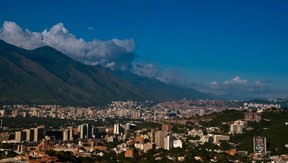 Without the people, Torre David would be a worthless ruin. It would stand testimony only to a turn of the Wheel of Fortune, which took dreams and left them to rot.
Without the people, Torre David would be a worthless ruin. It would stand testimony only to a turn of the Wheel of Fortune, which took dreams and left them to rot.
With the people, it looks like art, or poetry in motion.
The skyscraper has always seemed symbolic of something. The state of it reflects the city from which it grew. What happens to Caracas, happens to this construction too; and, as this is the capital, perhaps it also speaks of Venezuela as a whole. Or that could just be the artists and the poets pointing bardic fingers to convey a message.
When David Brillembourg financed the Centro Financiero Confinanzas, it was meant to be a shining beacon of Venezuelan wealth and business prosperity. On board was the distinguished architect Enrique Gómez. His construction was modern, luxurious and it gleamed! Its future residents were going to be from the elite in Caracas society. The whole development yelled loud and clear that the Venezuelan economy was stable and booming.
Until it wasn't. Work had to pause when Brillembourg died and the money momentarily dried up, while his estate was put in order. It stopped forever when a banking crisis hit a year later.
Now the skyscraper appeared exposed to the elements. Nearly completed, but for its higher reaches, as if it had reached too far. Locals called it the Torre de David (David's Tower), like there was some parable of Biblical proportions in this carbuncle. The lessons weren't difficult to discern. All the wealth in the world couldn't save you, if the market turned against you. Luxury left to the whims of the weather will spoil as easily as the lesser people's lot.
But then came the community. Homeless individuals and families, who saw in that towering edifice shelter for themselves. There were no lifts and half of the staircases were gone, or never completed. They used ladders and pulley systems to cart furniture up above. They made homes in the shells of half made offices. They created informal grocery stores and butchers' abattoirs high above the ground, to save the legs of their weaker members.
Torre David it is called. A symbol of resourcefulness and a dispossessed people refusing to crawl into a gutter to hide. Or perhaps the message is still political - don't waste space, as you would waste lives and prospects. Or is too much being read into this. Is it still a tragedy, when the wind whips through unbuilt walls, even when the homes within feel like poetic justice?
The skyscraper has always seemed indicative of the city beneath. Right now, it's the tallest squat in the world; and hope and home to 750 impoverished families.


 Without the people, Torre David would be a worthless ruin. It would stand testimony only to a turn of the Wheel of Fortune, which took dreams and left them to rot.
Without the people, Torre David would be a worthless ruin. It would stand testimony only to a turn of the Wheel of Fortune, which took dreams and left them to rot.
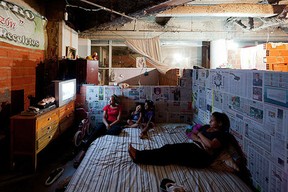 The people who live in the half-finished skyscraper have not been idle. Bricks and bags of cement are hoisted up several floors to fix walls or create living spaces. It's hard and dangerous work, but if it benefits the families, then it's worth the effort.
The people who live in the half-finished skyscraper have not been idle. Bricks and bags of cement are hoisted up several floors to fix walls or create living spaces. It's hard and dangerous work, but if it benefits the families, then it's worth the effort.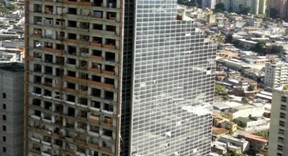 While the community feeling in Torre David is undoubtedly something to be admired, there is a danger that the reality could be lost in the romance of it all.
While the community feeling in Torre David is undoubtedly something to be admired, there is a danger that the reality could be lost in the romance of it all.





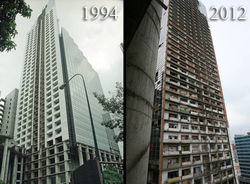

 St Tydecho's Churches in West Waleson 09/03/2014
St Tydecho's Churches in West Waleson 09/03/2014
 Goodies for an Outlander Premiere Partyon 03/06/2015
Goodies for an Outlander Premiere Partyon 03/06/2015
 Holocaust Memorial Day Interview with Rainer Höss, Grandson of Rudolf Architect of Auschwitzon 01/24/2015
Holocaust Memorial Day Interview with Rainer Höss, Grandson of Rudolf Architect of Auschwitzon 01/24/2015
 Romantic Valentine Gifts for an Outlander Fanon 01/16/2015
Romantic Valentine Gifts for an Outlander Fanon 01/16/2015

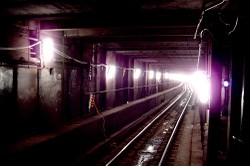

Comments
Thank you very much. It's amazing how resourceful the human race can be, isn't it?
Excellent, very interesting article!
Thank you very much. :)
fascinating article
2uesday - they had nowhere else to go. It was either up there or on the streets. Yes, it's very illuminating.
Hollie - I hope that they're never evicted either, but I can't see that being the case. It's prime real estate in the middle of the financial district.
Clearly not an ideal place to live, but bears testament to the human spirit and determination to make the most of what they have. I hope they're never evicted. :)
It's a fascinating story isn't it? A strange mixture between Heaven and Hell; with political, sociological and all kinds of different angles story to tell too.
Wow. I wouldn't want to live there (of course, I'd rather head for the woods anyway. but it's amazing to hear about the cooperative spirit there. We could all use a little help now and then. Great story.